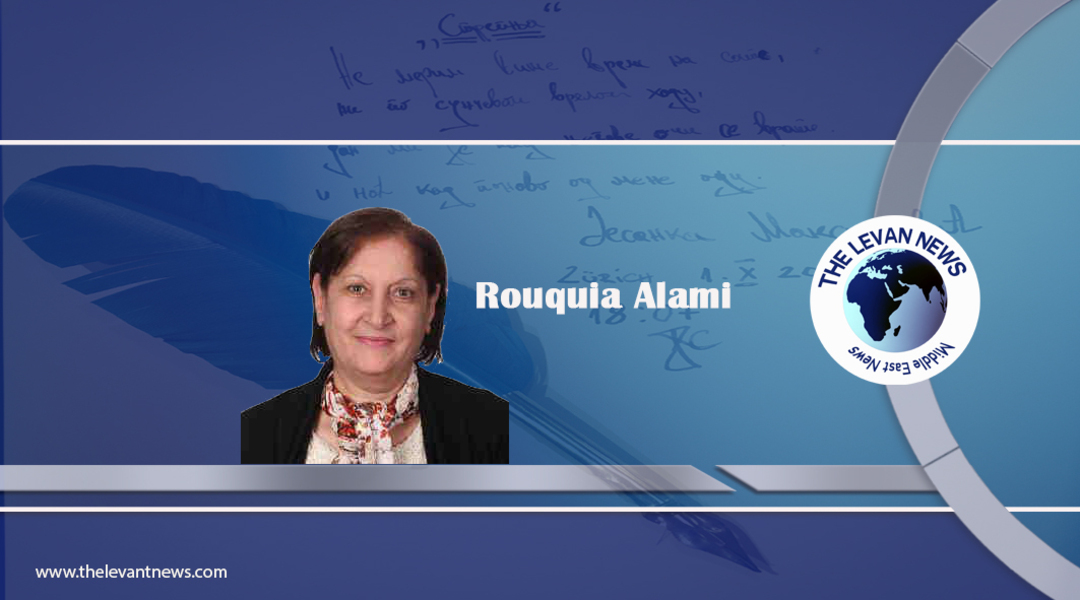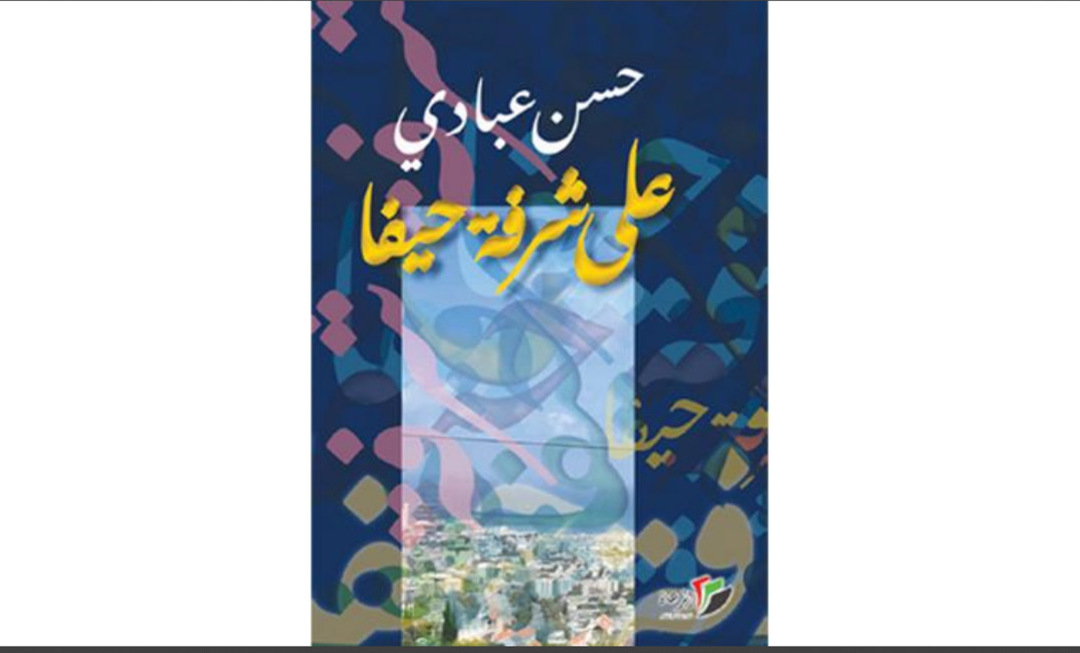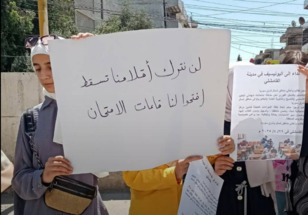-
Over Haifa Balcony

The displacement of Palestinians who were forced into exile and became refugees in other countries was a result of the Palestinian Nakba of 1948. Nevertheless, some Palestinians have remained in Occupied Palestine and are known as “1948 Arab Palestinians”.
No matter where Palestinians live, wherever they go, whatever they are entitled to, they are refugees, displaced, imprisoned, living in the exile or living inland; Palestine was and always be in their conscience and is reflected in their art, literature, geography, history, heritage and every other aspect in life. This includes the uncountable efforts going towards retaining the Palestinian identity, an ongoing act as a main form of resistance.
The Palestinian land was preserved and protected from being forgotten by generations of Palestinians through storytelling and continuous recitation of folklore and heritage.
Raed Hawari, a Palestinian critic and writer, states:
"Literature has continued to maintain its importance throughout history, as an authentic material for what nations and peoples have experienced. From here, we find Palestinian literature dealing with the issues and concerns of Palestine and its people, whether through poetry, oral and written stories, novel, or article."
This subject is reflected in the newly released book "Over Haifa Balcony."
Over Haifa Balcony a new book, released August 2023, by author Hassan Abbadi, is a collection of stories, published by Al Ruaa for Studies & Publishing in Ramallah.
When I posed the question to him: "Are those stories actual and happening or are they imagined?
“Abbadi replied:
"There are stories that are real and others that are based on the reality of our Palestinian society. Its events have taken place, are taking place, and will take place in the future."

The stories in the book recount many stages that the Palestinian people went through: the Nakba, the first Intifada, and the suffering of Palestinians revolve around and within their land in Palestine.
The story entitled: Abed Taltlim (taltlim means curly hair) describes the reality of the suffering of the Palestinian people: the confiscation of their land by the occupier that resulted banning them to cultivate in their own properties.
"Abed moved from his peaceful village in Algalill to live in Haifa after his family's lands were completely confiscated, and therefore were prevented from cultivation, as a result Abed's father died of grief over this loss."
The characters’ stories Abed, Hussein, Hassan, Bahja, Khader, Um firas, Mimi and Kefah, emphasize the attachment to the soil of their country, the heritage of the daily inherited customs attached to the land, like picking grapes, drying them to get raisins, and the daily food customs like baking pastries with Za'atar (thyme) and cooking a'koub, both Za'atar and a'koub are plants growing in the wilderness of Palestine and known to be one of main traditional food.
Samira Abbadi, the writer's wife, explained the relationship of the collection towards the balcony of their own house in Haifa; reflections that gave birth to these stories:
"From this balcony, we unleashed ideas that were trapped, thereafter, developed into stories, some of them made us laugh, others made us sad and painful. These short stories accumulate the bitterness of anguished population".
According to Palestinian writer Feras Haj Mohammed:
"The book contains 38 short stories and very short ones; it deals with multiple social, political national and cultural topics.
The characters in these stories belong to the world of the marginalized and common people. The dialogues relied on the popular heritage expressions and proverbs; that came in harmony with the themes of the stories.
The book cover is designed by Palestinian artist Thafter Shorbaji whereas the stories are designed by paints illustrated by Palestinian artists:
Yousef Al-Iraqi and Fouad Aghbariya. Including images of landmarks from Jerusalem, destroyed and abandoned towns and cemetery
Palestinian villages photographs reinforced the text, sights from Palestine, were captured by Shaden Abbadi, Muhammad Hibbi and Raif Musa Higazi cameras."
Example proverbs and expressions that are used in everyday life in the Palestinian society, as a symbol of popular heritage were used in the story and reassure the existence of Palestinians in their homeland, such as:
On your cheeks, only use the mud of your own country soil.
The homeland is precious, Bahja
This land has its own owners.
The Haifawi Hassan Abbadi is a lawyer, human rights advocate, and cultural activist; born, in 1959, and has lived his entire life in the occupied city of Haifa; well-known as a supporter of the literature of Palestinian prisoners in Israeli jails. Combined with his own efforts, he is the creator of the initiative:
"For every prisoner, a book" and "From every prisoner, a book.”
A project that aims to deliver books to prisoners; its other part includes facilitating the production of books written by Palestinian prisoners and authors.
In addition to his diverse agendas, he is working to enhance the Arabic culture in the “1948 Arab Palestinian” society, mostly in his book highlights the reality of Arab Palestinian people of 1948.
Balcony over Haifa, is his fifth book, previously he published:
Eva Shatal Hamed
Umaima Did not Leave the hill
Our Thyme is Green
Writing by the Candlelight
To me, after reading the book, I felt different emotions generated by the stories. Some are sad; others are funny. In conclusion, all stories point to liberation from the occupation that will lead to the return to Palestine.
Yet, for one, a beautiful view from the balcony of Haifa, a terrace that had witnessed whatever was, whatever will be, looking over the occupied Haifa city.
Rouquia Alami
You May Also Like
Popular Posts
Caricature
BENEFIT Sponsors BuildHer...
- April 23, 2025
BENEFIT, the Kingdom’s innovator and leading company in Fintech and electronic financial transactions service, has sponsored the BuildHer CityHack 2025 Hackathon, a two-day event spearheaded by the College of Engineering and Technology at the Royal University for Women (RUW).
Aimed at secondary school students, the event brought together a distinguished group of academic professionals and technology experts to mentor and inspire young participants.
More than 100 high school students from across the Kingdom of Bahrain took part in the hackathon, which featured an intensive programme of training workshops and hands-on sessions. These activities were tailored to enhance participants’ critical thinking, collaborative problem-solving, and team-building capabilities, while also encouraging the development of practical and sustainable solutions to contemporary challenges using modern technological tools.
BENEFIT’s Chief Executive Mr. Abdulwahed AlJanahi, commented: “Our support for this educational hackathon reflects our long-term strategic vision to nurture the talents of emerging national youth and empower the next generation of accomplished female leaders in technology. By fostering creativity and innovation, we aim to contribute meaningfully to Bahrain’s comprehensive development goals and align with the aspirations outlined in the Kingdom’s Vision 2030—an ambition in which BENEFIT plays a central role.”
Professor Riyadh Yousif Hamzah, President of the Royal University for Women, commented: “This initiative reflects our commitment to advancing women in STEM fields. We're cultivating a generation of creative, solution-driven female leaders who will drive national development. Our partnership with BENEFIT exemplifies the powerful synergy between academia and private sector in supporting educational innovation.”
Hanan Abdulla Hasan, Senior Manager, PR & Communication at BENEFIT, said: “We are honoured to collaborate with RUW in supporting this remarkable technology-focused event. It highlights our commitment to social responsibility, and our ongoing efforts to enhance the digital and innovation capabilities of young Bahraini women and foster their ability to harness technological tools in the service of a smarter, more sustainable future.”
For his part, Dr. Humam ElAgha, Acting Dean of the College of Engineering and Technology at the University, said: “BuildHer CityHack 2025 embodies our hands-on approach to education. By tackling real-world problems through creative thinking and sustainable solutions, we're preparing women to thrive in the knowledge economy – a cornerstone of the University's vision.”
opinion
Report
ads
Newsletter
Subscribe to our mailing list to get the new updates!






















